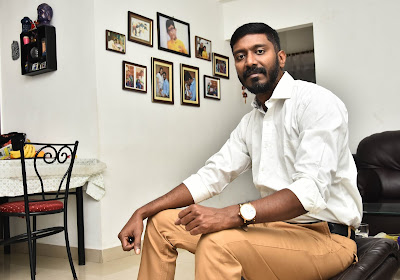The Chennai-based maxillofacial surgeon Dr James Jesudasan talks about his experiences in dealing with Nigerian children affected by Noma, a bacteria that eats up the face
Photo of James by Aswin Prasath
By
Shevlin Sebastian
It
was a routine biopsy. The boy was one-and-a-half years old. He had a
swelling on his face. It looked like a tumour. At the Nomo Children’s
Hospital at Sokoto in Nigeria (750 kms from Lagos), Dr James
Jesudasan, a Chennai-based maxillofacial surgeon, stood poised over
the boy with a scalpel in his hand. On either side of him were his
colleagues Julia Amando of Brazil and David Shaye from the USA.
James
paused and, inexplicably, tears began to roll down his face.
Julia
looked at James and said, “What’s wrong with you? Get on with
it.”
James
shook his head, and said, “I can’t. Will you do it?”
Julia
nodded and did the biopsy within two minutes.
Looking
back, James, 36, says, “This boy had a look of fear and anxiety. He
was also crying. I suddenly realised that I had a son, who is
slightly older, at five years. Maybe, all this caused me to tear up.”
James
was in Sokoto at the behest of Médecins Sans Frontières (Doctors
Without Borders), the international NGO that works in conflict zones
and in countries affected by epidemics. He was there to deal with
children who had been afflicted by a disease called Noma.
It
is a bacterial infection which occurs because of excessive
malnutrition in poverty-stricken countries. It starts off with a
blister in the mouth which develops into ulcers. Soon, the tissues
degenerates. When this happens, the surrounding tissue gets hardened.
As a result, the jaw gets locked and eating becomes very difficult. A
huge opening is formed in the area of the nose and mouth.
So
James’s brief was to repair faces, restore dignity, and unlock jaws
so that the children could start eating again.
The
method is straightforward. “If a child has half his face missing,
then, along with the plastic surgeon, we have to try and reconstruct
the face,” says James. “You can use a flap from the shoulder,
forehead or the deltoids. We take both skin and muscle.”
After
it is done, healing has to take place. This can take anywhere between
three to six weeks. “Since we come for three weeks at a time,
another team will carry on the work,” says James. “They will
consult the notes that we have written and our suggestions.”
It
takes years before some semblance of normality can be brought back to
the face. But what brings joy is to know that the children can start
eating. For a long time, they only had gruel. “Since it is a
meat-eating society, the children have told me that one of the first
things they will eat is chicken,” says James.
Not
surprisingly, they are extremely grateful. On his last visit, in
October, they prepared a poster, titled ‘James’ at the top. Then
they made circles inside in which they drew stars, heart emojis, and
butterflies. Pressing on each drawing was the child's thumb
impression in red and their names. “I was moved,” says James.
Even
as James was happy, he was appalled at the economic disparity in
Nigeria. Thanks to a petrodollar economy, there is an extremely
affluent class in the country. “I have travelled to many parts of
the world but I have not seen so many huge bungalows and expensive
cars like Lamborghinis, Porsches and Bentleys that I saw in Lagos,”
says James. “At the same time, there are so many poor people. I
doubt whether Nigeria has a middle class. And sadly, not many people
know of Noma.”
So,
in order to create awareness, on November 19, MSF held an
International Noma Day in the federal capital of Abuja. “Hopefully,
government funding will start flowing to the affected areas,” says
James.
Meanwhile,
when asked whether the reconstruction is 100 percent, James shook his
head. “We can get to about 70 percent,” he says. “You will have
something which looks like a nose, and a functional mouth. But when
you look at them you will realise they are not normal people. We
cannot do reconstructive surgery the way it is done for Hollywood
stars. That's because we are working in a primitive area of the
country and using basic equipment. But now the MSF is training local
doctors so that treatment can continue after we leave.”
For
James, it has been a transformative experience. “I have learned to
value life,” he says. “Earlier, I had taken a lot of things for
granted. To see these little children go through so much pain and not
complain at all has been an unforgettable experience.”
(Sunday
Magazine, The New Indian Express, South India and Delhi)


No comments:
Post a Comment